
Latest News
- Hyundai E&C Becomes Key Player in the Nuclear Decommissioning Market
- Hyundai E&C Accelerates Global Nuclear Expansion into the U.S. Nuclear Market
- Hyundai E&C Shifts into High Gear to Enter Nordic Large-Scale Nuclear Market
- Hyundai E&C Strengthens Korea-Japan Cooperation in Energy Transition and New Growth Businesses
- Hyundai E&C Signals Green Light for Large-Scale Nuclear Power Plant Business in Europe
The Timeless Spirit of Hyundai Origin
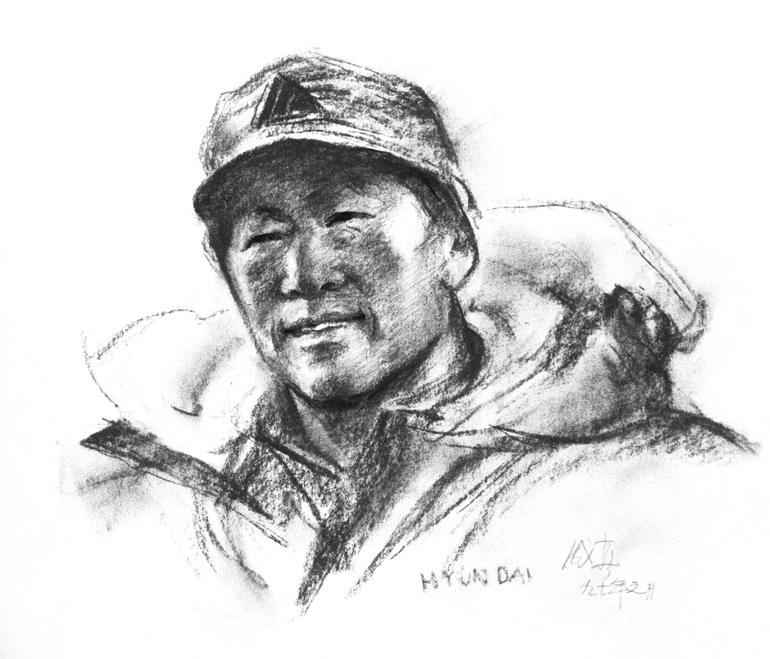
Courage to take a step forward in the pitch darkness, creativity to turn the impossible into the possible, and a powerful drive to pioneer the future without resting on one’s laurels: These strengths form the DNA and competitiveness of Hyundai E&C that will forever stand the test of time. Twenty years have passed since former Chairman Chung Ju-yung of Hyundai E&C passed away to his final rest. Despite the passage of two decades, the legacy of his great spirit remains right here with the people of Hyundai.
A game changer : Innovation ahead of the times
It was always clear that former Chairman Chung possessed a unique aptitude for innovation. His inimitable drive lent him the nickname of “bulldozer,” but this did not mean that he was the type of person to push ahead with business decisions thoughtlessly. Rather, it was simply that most of his achievements seemed impossible to other people at the time.
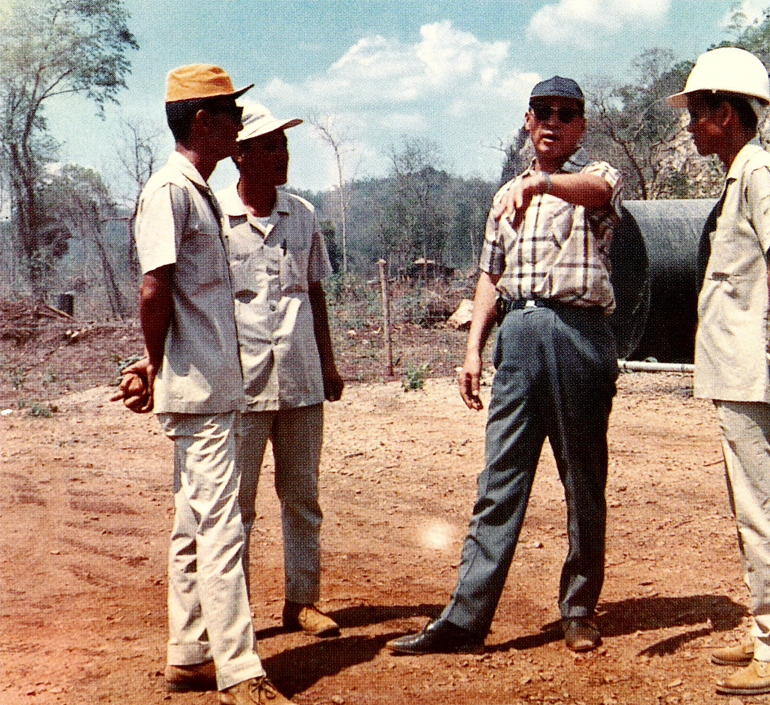
[Chung giving instructions at the Pattani-Narathiwat Highway construction site in Thailand]
When Chairman Chung set out to build the Gyeongbu Expressway, many people said that it would be “impossible.” His plan was met with strong opposition both at home and abroad, that it was yet premature for Korea to build an expressway and that he had absolutely no knowledge or experience of civil construction. Others tried to convince him that it was a preposterous idea to ship enormous supplies of construction materials on barges from Ulsan Port in Korea to Jubail Port in Saudi Arabia for the construction of the King Fahad Industrial Port, one of the largest construction projects of the 20th century. However, Chung’s firm resolve and willpower rendered all of their concerns meaningless, demonstrating the power of thinking outside of the box.
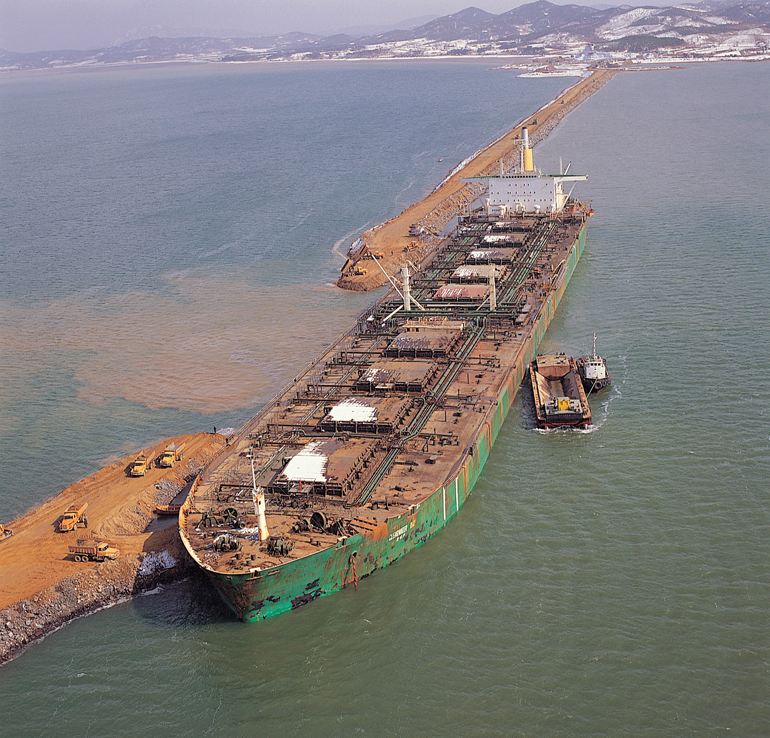
[Seosan Reclamation project in February 1984]
His spirit of taking on challenges beyond the conventional framework of business laid the foundation for Hyundai E&C to enter the overseas market for the first time among Korean construction companies. Former Chairman Chung once remarked, “There can be no leap forward without taking a risk.” True to his words, he obtained the order to build the Pattani-Narathiwat Highway in Thailand in 1965, beating 29 competitors in 16 advanced countries. At a time when Korea had no expressway at all, the departure of Korean engineers and workers to Thailand marked an astounding achievement that was broadcast live by KBS (Korean Broadcasting System).
Chung Ju-yung is remembered as a game changer who led the transformation of Korea in the 20th century. Around 1977, at the peak of the Middle East construction boom, he started to plan the Seosan reclamation project with the aim to expand the country’s landmass. Though the project was far from profitable, he nonetheless bulldozed his way forward with the belief that land is one of the most valuable legacies that could be left behind for generations to come. The most challenging part of the reclamation project was to deal with the extremely fast ocean currents, which could sweep away a car-sized rock in an instant at a speed of eight meters per second. As he was ever able to find a way forward in the face of any obstacle, Chung came up with a unique construction method. His unprecedented idea of utilizing abandoned oil tankers enabled Hyundai E&C to successfully build a cofferdam, which is essential for breakwater construction, thereby adding 16,000 hectares of land to the country or one percent of its entire landmass.
“Human potential is limitless. This infinite potential promises unlimited possibility for all. We can do anything when we stay true to our beliefs and dedicate enough hard work.”
- Born of This Land: My Life Story, a biography of Chung Ju-yung
A builder and a man of his word
Former Chairman Chung placed his top priority in terms of management on the principles of diligence and trust. In April 1953, when the country lay in ruins in the aftermath of the Korean War, he raised the flag of Hyundai E&C in the war-torn nation by restoring the Goryeong Bridge connecting Daegu and Geochang. It was a matter of urgent necessity to reconstruct the bridge in order to facilitate the transportation of supplies and the suppression of guerillas in Girisan Mountain. The 195-meter Goryeong Bridge was considered a long-span bridge at a scale rarely seen at that time. During the project, Hyundai E&C was faced with many obstacles, such as the almost entirely destroyed state of the bridge with only its foundation remaining, the seasonal changes in the water level of Nakdonggang River, and a rapid increase in materials and labor costs resulting from hyperinflation. Valuing trust over all else, however, he refused to give up on the project despite taking on almost 20 years’ worth of debt. His efforts deeply impressed the Korean government, and lent Hyundai E&C a reputation as a trustworthy company.
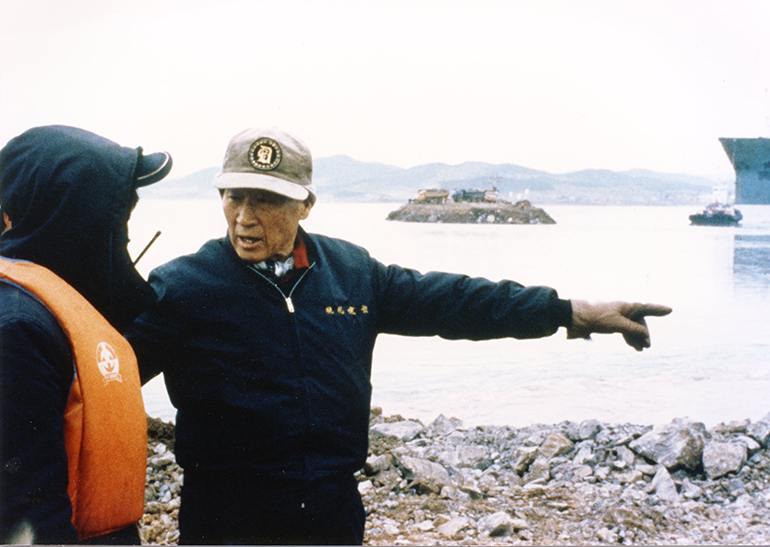
[Chung was nicknamed the “tiger of the construction site.” He took full responsibility to complete construction projects by placing the top management priority on diligence and trust]
Starting with the expressway construction in Thailand, Chairman Chung jumped into the overseas construction market, based on the belief that each day without progress is a step backwards. However, no accomplishment came without its own set of obstacles. The situation at the construction site seemed so unfavorable that there were endless proposals to suspend the project. Chung simply responded that the project had to be completed no matter what and that it was Hyundai E&C’s duty to complete the construction of a high-quality expressway in Thailand on schedule. He also added that the suspension of construction works was unacceptable for the sake of not only Hyundai, but also the national standing of Korea. As such, Hyundai E&C’s first overseas project recorded deficits worth 288 million won, a significant amount of money at the time. Ultimately, Hyundai E&C overcame all difficulties and successfully finished the project, impressing the Thai government enough to entrust the company with five more orders for expressway construction.
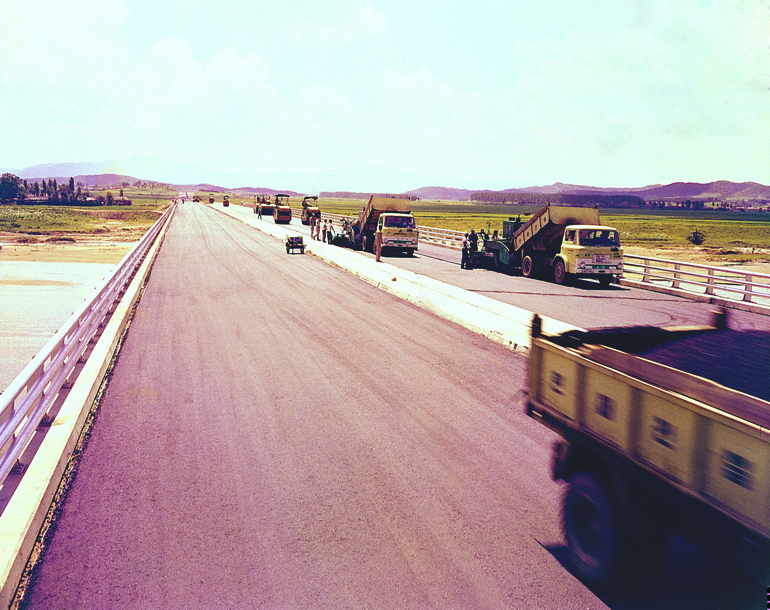
[Construction of the Gyeongbu Expressway]
In the Gyeongbu Expressway project, Hyundai E&C used early strength cement, which is three times more expensive than general cement, with the aim to meet the construction schedule. As Chung had abandoned any concern for profit at the outset of the project, he believed that satisfying the construction schedule took precedence over turning a profit. Often remarking “I will always choose trust over profit,” Chung was a man who could accept losses in the interest of national development. To others, he introduced himself as a “builder.” His personality was a perfect fit for the construction of various industrial facilities, infrastructure and social overhead capital facilities, a field that requires both boldness and precision.
“I enjoy the sense of achievement. In addition to Hyundai E&C, I’ve come to run many businesses and earn a number of titles, such as group chairman, honorary chairman, or sometimes a ‘businessman.’ But in my heart, I never lost my pride as a ‘builder’ who works in the construction industry.”
- Born of This Land: My Life Story, a biography of Chung Ju-yung
A warm-hearted tiger
Though referred to as a “tiger” in construction sites for his stern demeanor, former Chairman Chung was warm-hearted and generous outside the workplace. He drank makgeolli (raw rice wine) with the workers and played ssireum (Korean wrestling) with new employees at orientation events to communicate better with younger generations. Chung believed that he could not have built Hyundai without the help of technicians, executives and employees, whom he regarded as his companions. Seeing himself as just a “more well-off worker,” he was always wary of management staff with authoritarian attitudes. In this regard, he established Hyundai’s personnel management guidelines, which stipulate that managers should treat workers respectfully and address them politely; encourage workers to work autonomously by motivating them instead of simply giving orders; and make efforts for self-development since their personality can greatly influence the workplace atmosphere.
“We must never forget that we are all equal. A great society is built on the ideal of equality. Workplace hierarchy only applies to work and does not determine our value as people. Workplace superiors should not flaunt their status, nor should subordinates feel small and weak.”
- Born of This Land: My Life Story, a biography of Chung Ju-yung
![[직원들과 스스럼 없이 어울리며 소탈하게 웃고 있는 선대회장] [직원들과 스스럼 없이 어울리며 소탈하게 웃고 있는 선대회장]](/FileContents/EditorImg/20210325/본문(1).jpg)
[Chung smiling while mingling freely with employees]
Chung always appreciated the executives and employees of Hyundai E&C for their all-out efforts to complete difficult construction projects in Korea and abroad. In order to share the profits generated through their efforts and devotion with the underprivileged, he established the Asan Foundation on July 1, 1977. In doing so, former Chairman Chung contributed 50 percent of his shares in Hyundai E&C, valued at about 50 billion won at the time, which far exceeded the annual welfare budget of 19.5 billion won allocated by the government. With the aim to grow the Asan Foundation into a great institution equaling the Rockefeller Foundation and the Ford Foundation in the U.S., he divided the foundation’s activities into four areas, consisting of medical support, welfare, research and development, and scholarships. He dreamed of creating a world where poverty does not prevent people from being treated for diseases or spending time with their family, or force them to give up on their studies. In the late 1970s, a time when the entire country struggled to lift themselves out of poverty, corporate social responsibility was a deeply unfamiliar concept. Nonetheless, Chung promoted large-scale private social welfare programs based on the forward-looking belief that a company’s existence becomes meaningful only when its foundations – the rest of society and country – remain healthy.
“Sickness and poverty create a vicious cycle. Sickness pushes people into poverty, and they cannot seek treatment because they are poor. Hyundai was only able to keep growing to date thanks to the health and competence of its workforce. It was my longstanding wish for Hyundai’s wealth to be put to meaningful use for people in need.
- At the press conference for the establishment of the Asan Foundation
The deep-rooted resilience of Hyundai E&C
In many ways, former Chairman Chung Ju-yung was a born optimist. When he worked as a manual laborer in Seoul at a time when he had no one to rely on, and everyone disparaged his ideas as impossible pipedreams, he refused to feel frustrated or disappointed and instead dedicated his utmost efforts to build a better life, based on his firm conviction that his innate health and diligence would allow him to take a step forward with each new day.
.jpg)
[Chung examining documents in his office at the company’s head office in Gye-dong, Seoul, where he keenly oversaw management activities]
Chung had the ability to find a new path out of nowhere and make something out of nothing. His mindset lives on in the people of Hyundai E&C today. Based on diligence and trust, Hyundai E&C is building landmarks around the world as Korea’s foremost builder, making numerous records of being “the first and best” as one of the top global construction companies through a spirit of challenge and innovation. Chung’s wish to fulfill the company’s corporate social responsibility has led to its ability to provide the highest quality of services for customers and CSR activities for marginalized people.
March 21, 2021 marks the 20th anniversary of Chairman Chung’s death. In life, he was a diligent worker and a consummate businessman, whose stories continue to inspire countless people today through books and documentaries. The path that former Chairman Chung Ju-yung walked remains alive in the unwavering sprit of Hyundai E&C and offers hope to all of us as we live through this uncertain time of the pandemic and economic instability.
“Asan Chung Ju-yung” in the eyes of Hyundai E&C colleagues
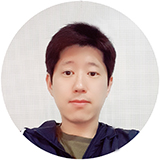
Han Ji-soo, Senior Manager of the Chinchero Cusco International Airport construction site in Peru
“Every time I travel between the head office and construction sites in Korea and abroad, I do feel a slight sense of pressure due to new tasks and changes in the environment. In such situations, I often recall what former Chairman Chung said about exercising patience and strong willpower to overcome problems. I am currently stationed at Hyundai E&C’s first construction site in Peru. I promise to work to the best of my ability each day in remembrance of Chairman Chung’s passionate enthusiasm.”
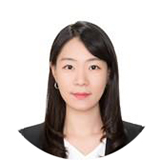
Kim Mi-sun, Researcher of the Green Bio Smart City Team
“As I work on the development of the Seosan Special Zone, I’m often reminded of former Chairman Chung’s passionate wish to help Korea develop into a better country. Today, the reclaimed land in Seosan is transforming itself once more into a special zone equipped with a digital-based agricultural bio-research complex, as well as future mobility, smart city and eco-friendly energy facilities. Inheriting Chairman Chung’s spirit, I’d like to continue my work with a sense of calling. Go, Hyundai E&C!”
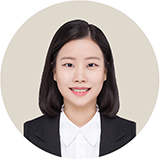
Shin Hyun-hui, Manager of the Overseas Construction Business Group
“Every moment in the former Chairman’s life shined with his daring spirit and enthusiasm, which is unsurpassed even compared to today’s youths in 2021. The exhibition held in the company’s Gye-dong head office allowed me to feel his passion once again. It was great to see his humanity through photos showing moments with his family and workers, in addition to his charismatic personality. Although I never met him in person, I miss and respect him.”

